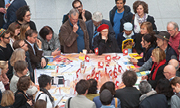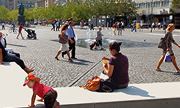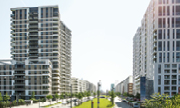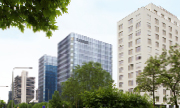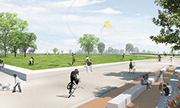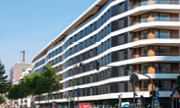Frankfurt is a growing, prospering city with a population and employment figures which have been steadily increasing for years – and there is no end in sight to this development. According to current population forecasts there will be an estimated 830,000 inhabitants by 2040, about 120,000 more than today.
This positive starting position does, however, also create major challenges for the city. Frankfurt’s new citizens need housing, work and training places. They want to go shopping in a lively environment where they can meet friends in a cafe or restaurant. In their free time they want to do some sport, go to the theatre or relax in the park. Children and senior citizens need amenities tailored to their needs and the distances between places should be as short, safe and pleasant as possible. Harmful effects on Nature and the environment should be avoided.
Even this short overview of the many diverse different needs makes it clear that the development of the social city must take economic, ecological and social aspects into account in equal measure. Growth should be used to reinforce our home town as a liveable, sustainable metropolis. It must be designed actively and channelled in the right direction, not only to create new quantities but, above all, new urban qualities. The integrated urban development currently being drawn up will make an effective contribution to this as a development framework and guiding strategy.
For some time, Frankfurt has been pursuing the aim of inner-city development in order to foster urbanity and preserve open spaces, whereby the City Centre Concept, the Europa and Lyoner districts are important components in this. But suburban consolidation can also make sense and bring about new open space qualities. Impressive examples of this are the Ernst-May district as well as the city’s efforts to promote passive- and “plus-energy” house construction.
The city also performs functions which extend far beyond the city’s limits. Frankfurt is the core of the dynamically-developing FrankfurtRheinMain metropolitan area with 5.5 million inhabitants and almost 3 million employees. Frankfurt’s many job opportunities attract 330,000 commuters every day, boosting its daytime population to over one million, not counting the students at the seven universities and colleges, Trade Fair and Congress guests and visitors on shopping trips to the city or visits to the opera. The increasingly interrelated spatial-functional links in the conurbation make it necessary to think more and more “out of the box” and contribute to regional initiatives and spatial planning strategies. It is a matter of structuring the interests of the city and the Region sustainably in a common context.


